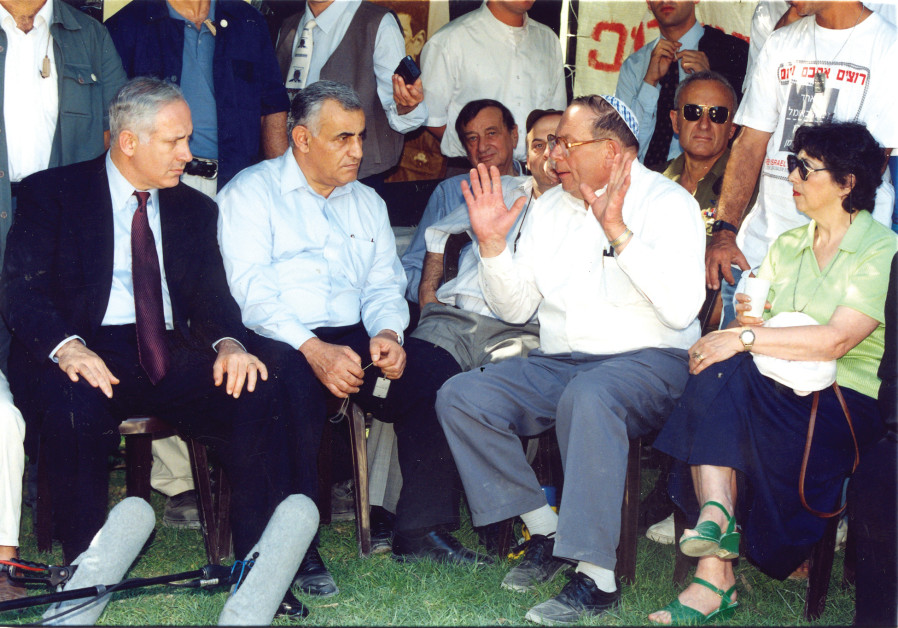Baumel’s return shows Israel’s commitment to its fallen – comment

Prime Minister Benjamin Netanyahu and then-defense minister Yitzhak Mordechai listen to Yona Baumel (gesturing) as Baumel’s wife, Miriam, (right) looks on, in 1997. (photo credit: BRIAN HENDLER)
The timing can hardly be more proverbial.
With the moonless sky announcing the month of Nisan’s approach while households the world over prepare for Passover, the Jewish nation has been given an eerie reminder of the Exodus’s forgotten participant, the long-dead Joseph.
“Moses took the bones of Joseph with him,” says the Bible (Exodus 13:19), quoting his demand in his last days (Genesis 50:25), and ultimately reporting that “the bones of Joseph, which the Israelites had brought up from Egypt (Joshua 24:32),” were indeed buried in their homeland as Moses had planned and Joseph willed.
Historicity aside, what the Israelites carried on their shoulders for 40 years from the Red Sea’s menacing waters through the Sinai Desert’s punishing heat was more than one man’s remains; it was the value of honoring the dead.
The principle that inspired a whole set of Jewish laws, such as the exemption from prayers while handling the dead or the prohibition of eating while in one room with a dead body, became a guiding value of the IDF from its inception.
Built from the onset with its own Chief Rabbinate, the IDF immediately tasked its chaplains with collecting fallen soldiers’ bodies from the battlefields of the raging War of Independence, and bringing them to the kind of proper burial the Israelites gave Joseph.
Developing already then the expertise they would assume in identifying bodies, the Military Rabbinate’s founder, then-Lt.-Col. (and later Maj.-Gen.) Rabbi Shlomo Goren, was summoned by David Ben-Gurion in 1949 for a special assignment.
The Egyptian Army, which by then was encircled in the Negev, had wiped out an entire infantry company from the Alexandroni Brigade, leaving 87 Israeli bodies behind enemy lines.
Ben-Gurion’s demand, “Find them and bring them home,” needed no explanation. It was for Goren what Joseph’s will was for Moses, and what Joseph’s bones were for the generations of pallbearers who carried them to Shechem (Nablus) from the Nile.
Goren therefore approached the Egyptians’ commanders and requested their permission to cross their lines and seek the bodies. The Egyptian commander, Maj. (later Col.) Gamal Abdel Nasser, personally escorted Goren to a mound where all 87 troops were collectively buried.
Nasser and Goren, respectively the future president of Egypt and chief rabbi of Israel, soon found themselves standing shoulder to shoulder surveying a funereal convoy of military vehicles that, after an Egyptian squadron’s salutary salvos, departed to Jerusalem with the IDF’s dead.
It was but a detail in a broader picture, whereby 1,000 IDF soldiers’ bodies were stranded behind enemy lines, leading Goren to demand and obtain their reburial in Israel as part of the Armistice Agreements that ended the War of Independence.
IDF chaplains therefore descended on multiple burial sites in what then was Jordan, retrieved the bodies and brought them to Israel.
On November 17, 1949, in a mass funeral attended by tens of thousands, 228 of the former MIA’s were buried on Mount Herzl, thus inaugurating what became the IDF’s central cemetery.
Now, like Joseph after the Exodus; like the troops exhumed by the IDF’s pioneering chaplains; and though it’s been 37 years since he died in a distant battlefield – Zachary Baumel, too, is home.
Join Jerusalem Post Premium Plus now for just $5 and upgrade your experience with an ads-free website and exclusive content. Click here>>






Comments are closed.